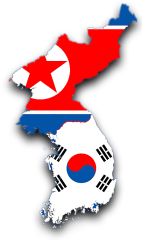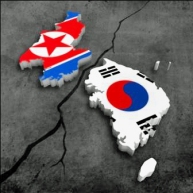 On the side, in recent years, I have followed the efforts to bring about a two-state solution between the Palestinians and the Israelis.
On the side, in recent years, I have followed the efforts to bring about a two-state solution between the Palestinians and the Israelis.
Of course, there are numerous differences between the case of Israel and Palestine and that of the two Koreas. Palestinians are a displaced people who want to regain (at least part of) their homeland, and some would be willing to live as two states along with Israel. By tradition, Palestinians are distant cousins of the Israelis, if one traces origins to Abraham’s family.
Although their language and political systems have diverged over nearly 70 years, the two Koreas are one people. There are already two states. In theory at least, these two states want eventually to reintegrate into one.
But it strikes me that what Israel/Palestine and the two Koreas have in common is that no progress toward a two-state solution or reunification can occur when either side, at the core, wishes the other did not exist.
The last three weeks have shown that the conflict between Israel and Palestine seems essentially premised on driving the other out of the region. It is a view of the other as “irredeemable;” therefore you cannot, from that point of view, have viable negotiations leading to a peaceful settlement. You hear: “The Palestinians should move out of Greater Israel and other Arab nations should resettle them;” or, “Hamas’s purpose is to slowly force Israelis to leave their homes and resettle in Europe or the United States so that Palestinians can reclaim their land.”
There is no sense that either people can peacefully live together. There seems to be the underlying belief that neither side can truly trust the other, therefore, the only solution is to reclaim the entire territory for one’s own people.
Thinking about this age-old conflict in the Middle East always brings me back to the unresolved situation on the Korean Peninsula. The song Arirang says “our cherished hopes are for unity” but in reality how can that come about if one side views the other as their crazy cousins whom they want nothing to do with? Instead, the tenor and fundamental premises of the inter-Korean conflict have in fact changed very little since the end of the Korean War in 1953.
What disturbs so many people about Israel’s third military intervention in Gaza is the seeming utter insensitivity and disregard by Israelis for the loss of civilian Palestinian life, including many women and children. It’s not about how successful or not the IDF is in limiting collateral damage; it’s about the inescapable implication that Palestinians are considered less human.
For all of South Korea’s economic successes in recent decades, what has it really achieved if all too many among the South Korean public see the people of North Korea as an issue they just don’t want to deal with? It’s much easier to say the North Koreans are dangerous, would overrun the South if they could, and it’s too expensive to contemplate peacefully integrating them into a reunified Korean state. It is much too convenient to pretend the North Koreans don’t really exist, don’t need to be taken too seriously, and when the time comes, if they have to, the South will have to pick up the pieces when the North collapses.
We don’t know the future of North Korea, but surely, whatever occurs, North Koreans will never forget what South Koreans really thought of them, and if they cared whether or not they existed. We know North Koreans have no choice in how they live. The implications of this prevailing national attitude in the South that has carried over from generation to generation, much like the prevalent Israeli worldview that has carried over about the Palestinians since before statehood, will surely haunt efforts to bring peace and reconciliation on the Korean Peninsula for years to come.
Update: See “When dead children have no names: Israel’s terrifying descent into numbness,” Haaretz, August 3, 2014
Update 2: See “At 90, a former Foreign Service officer looks at Gaza then, and now,” Los Angeles Times, August 8, 2014

